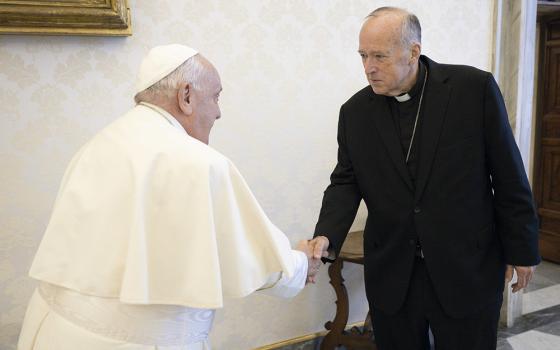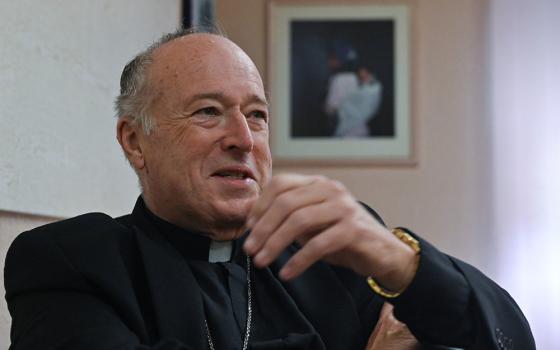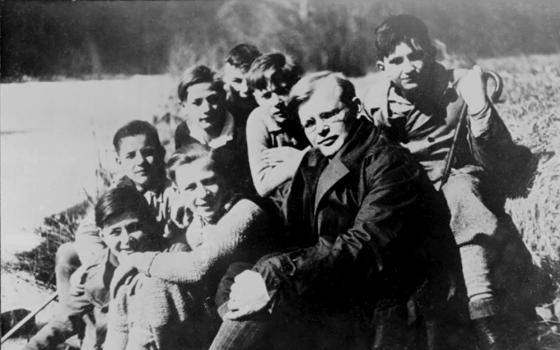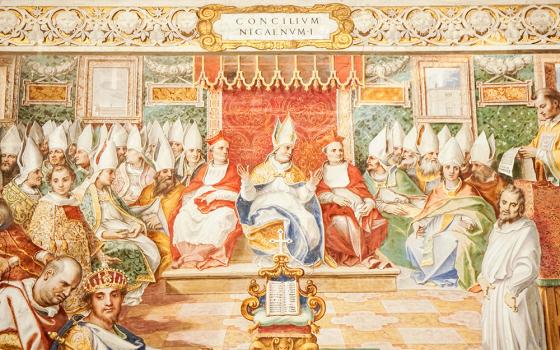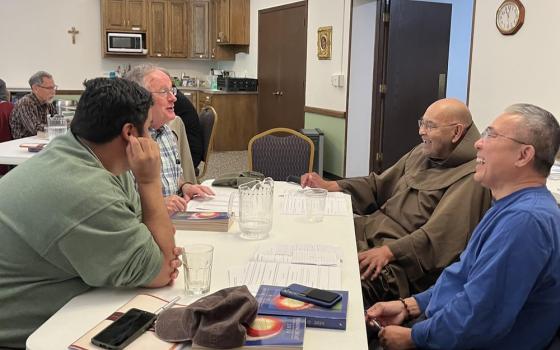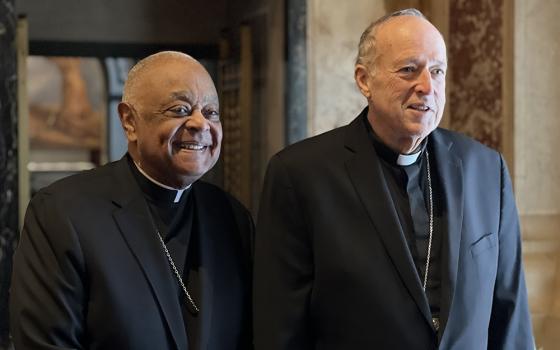Archbishop Paul S. Coakley of Oklahoma City is seen in this undated photo. On April 30, 2023, which was Good Shepherd Sunday, he released a 14-page pastoral titled "On the Unity of the Body and Soul: Accompanying Those Experiencing Gender Dysphoria." (OSV News photo/courtesy Archdiocese of Oklahoma City)
A Catholic response to those experiencing gender dysphoria "must both affirm God-given sex and recognize the struggle of the person in front of us," Archbishop Paul S. Coakley of Oklahoma City said in a new pastoral letter.
While the pastoral letter addresses "the anthropology underlying the transgender movement," the archbishop said, its purpose "is to provide pastoral guidance on how the Church, its ministers and the lay faithful can accompany -- walk with -- those who struggle with their gender identity, especially those who identify as transgendered."
Released on Good Shepherd Sunday, April 30, the 14-page pastoral is titled "On the Unity of the Body and Soul: Accompanying Those Experiencing Gender Dysphoria."
"We are called to bear witness to the truth inscribed in every human body and to do so with great love," Coakley wrote. "Most of us will not directly accompany someone struggling with gender dysphoria but may interact with friends or family who support 'gender affirming' treatment and the transgender movement.
"What is our role? As Pope Francis famously said, 'I see the church as a field hospital after battle. Heal the wounds, heal the wounds. And you have to start from the ground up.' Confusion about the goodness of the human body, the gift of biological sex, and what it means to be male and female are foundational wounds."
Among other themes, the archbishop discussed the "beauty and truth" of gender and "loving people in pain," and he directly addresses both those who are experiencing gender dysphoria and the parents of children experiencing this dysphoria.
"Jesus reaffirms for us that there are two sexes designed by God for each other. … The two God-given sexes give rise to the two genders, whose lived expression varies across and within cultures, creating the beautiful diversity among men that is masculinity and among women that is femininity," Coakley said.
Gender "should reflect the entirety of the person," he said, quoting Francis, who emphasized that the "biological sex and the socio-cultural role of sex (gender) can be distinguished but not separated."
Since the Fall, when Adam and Eve sinned in the Garden of Eden, "our freedom as human beings has been complicated and distorted by sin," Coakley said. "We seek goods, including identities, that fall far short of our ultimate Good in God."
Human beings try but fail to satisfy an "aching" in the soul with work, the desire for power, sex, alcohol, the internet "and constant noise" to numb "the pain of not finding satisfaction," he said. "Some of those suffering from gender dysphoria seek respite from their pain by identifying as the opposite sex or some (as) 'non-binary.' … We can all empathize with these individuals because each of us in our own unique circumstances has sought to rest in something other than God."
"What tremendous suffering it must be to feel a lack of congruity between one's sex and gender! We must tread lightly and with great compassion as we seek truth related to situations filled with pain," he added.
What must be acknowledged at the outset is "the immense pain found within this small segment of the population," Coakley said, citing a study by the William Institute at the UCLA School of Law that says an estimated 1.6 million children and adults identify as transgender, which equates to less than 1% of the population.
He said the U.S. Transgender Survey -- the largest study of people who identify as transgendered in the United States last conducted in 2015 and released in 2016 -- shows that 40% have attempted suicide at least once -- "a rate almost nine times higher than the general population." Nearly half (47%) of the respondents said they have been sexually assaulted at some point in their lifetime. More than half of the respondents (54%) said that while they were in school (K-12) they experienced verbal harassment, 24% said they were physically attacked and 13% were sexually assaulted.
"What is an authentic Catholic response to gender dysphoria?" Coakley asked. "We must avoid the extremes: to ignore the pain of the person and dogmatically assert that biological sex is the end of the conversation or to jettison the truth of the body in the false hope of relieving pain."
Advertisement
To those experiencing gender dysphoria, the archbishop admitted that "the path the Church lays out -- accepting the gift of your biological sex and working to heal your felt incongruity mentally, emotionally somatically and spiritually -- is arduous and currently countercultural. But it also is a glorious, grace-filled, path on which Jesus offers ever deepening wholeness and holiness."
"As a Church, we want to walk alongside you as you struggle with gender dysphoria. ... We want to help you know the unconditional love of Jesus and to bring Him to you in the Sacraments. You are a part of the Church -- you belong here and, truly, you are welcome here. ... I ask each person who is experiencing this confusion to trust Jesus with your pain."
To parents whose children are experiencing gender dysphoria, he encouraged them "to become curious and to ask gently about what their child is experiencing. The idea isn't to interrogate but to better understand."
He suggested asking questions such as: "In what way do you feel like" the opposite gender/both genders or neither gender? "When is the earliest/first time you remember feeling this way?" "Are there situations where that desire feels stronger?" "Are there situations where the pain of the struggle lessens?" "How does your faith influence your thinking on this topic?" "Are you considering your faith in relation to this topic?"
"These questions can start important conversations that help children and young people better understand themselves as well as help them feel heard, known, and loved," Coakley said.
The archbishop noted that many U.S. leaders "are stridently promoting what has been dubbed 'gender affirming therapy,' which seeks to bring the body into alignment with one's felt gender rather than working to align one's felt gender with biological reality."
"It is our responsibility to help children, family and friends understand that our Catholic faith and scientific research confirm this is not a helpful option," he said.
"Others tout puberty blocking medications for adolescents as an option to 'pause' their development," he continued, but this is "a transitioning on-ramp because more than 95 percent of children who use puberty blockers eventually transition to opposite sex hormones. It also is worth noting that puberty blockers and opposite-sex hormones are experimental, with long-term effects still unknown."
Coakley encouraged parents to go with their children to a Catholic counselor or, if none is available, to find a counselor focused on a psychotherapeutic approach to gender dysphoria. He also urged parents "to seek support and avoid isolation."
Regarding the transgender movement, he noted that "every generation has faced its own unique challenges with powerful forces rising to disfigure the human person and distort her relationship with God and neighbor."
In this cultural moment, "we are experiencing the rise of the transgender movement, which tragically attempts to promote and normalize transgenderism," Coakley said. "This cultural and political movement is and must be distinguished from the individuals who, suffering from gender dysphoria, identify as transgendered."
"The culturally dominant transgender movement has an understanding of nature and purpose radically at odds with the Catholic understanding of the human person," he said.
"Simply put," it is "an evil infecting our world in this time and place, and it must be rejected completely even as we love unconditionally those bound in its snares," he said.
